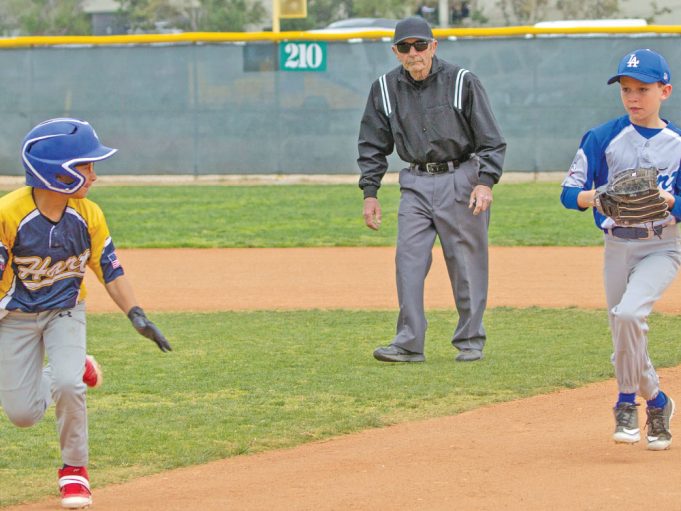Officials must be decision-makers versus reactors. Officials are trained to
make decisions based on plays and not just be reactors to the action. Rely and lean on your experiences and training to execute proper judgment on plays. Rules knowledge and familiarity to having seen a play or situation before help to make good, quality decisions.
Making decisions is arguably the one and only reason why they give us a paycheck. Sometimes, in the process of decision-making, we eliminate alternatives that may actually be better than the one we ultimately choose. That is one reason why officiating is so difficult — truly effective decision-making requires a considerable amount of data analysis, listening and reflection. We’re expected to decide sometimes hundreds of times during the course of a game, and we have to do it now.
Decisiveness is the ability to make the call, sell the call and engender a confidence in your ability as an official from all those involved in the game that you nailed it. And all that must be accomplished in a mere moment of time.
People often mistake speed for decisiveness. Speed is an element of being decisive, but it’s only one component. Tom FitzGerald of FitzGerald Associates, a consulting firm for CEOs, says decisiveness in any discipline has four components: speed (the time it takes to make a decision); importance (the nature of what is being decided upon); commitment (to carry out decisions, no matter how difficult); and rightness (the correctness of the decision).
Granted, most officiating decisions are simply a choice of call or no-call, out or safe, inbounds or out of bounds. But that doesn’t make the decision any easier when it’s truly a whacker and you’re trying to replay in your mind what you saw in order to come to the correct decision. All that while any number of players, coaches and spectators wait. Two seconds can seem like two weeks while you analyze and reflect on the play.
The problem with decisiveness is you are not born with it. It doesn’t come in the rulebook or with your new uniform. It is the result of a concerted effort on your part to improve in nearly every aspect of your game as an official. It comes with experience, but not automatically. You must strive for it. But once you have it, chances are you’ll be considered one of the top officials in your area.
In football, there are many times officials must decide whether or not to throw a flag on a particular play. Knowing what impact the potential flag has on the play is part of that decision-making process. For example, an official must determine if a player is holding his opponent or if the blocked player can fight through the contact, as well as whether the action has a material effect on the play. Is an advantage being gained?
In soccer, the striker has the ball along the wing, beats a defender, is turning the corner to the goal and is inside the penalty area when a defender comes in to make a tackle on the ball. The tackler is very close to committing a foul. Everyone looks to the referee to make a decision on the play. Is the tackle legal and a no-call correct? Or is the tackle a foul resulting in a penalty kick giving the attacking team a chance to tie the game, forcing the overtime shootout?
In that situation it is easy to react — to empathize with the team that has worked to tie the game. A reactor may just go with a penalty kick because he or she is caught up in the emotion of the game. However, an official is there to make a ruling on the play. Officials have the training and ability to put aside the emotion and bias of the moment to make an accurate decision.
Volleyball officials have many different decision-making processes to go through in each rally. They must determine if the play at the net is legal and whether the net is contacted, for example. Is there prolonged contact with a ball or is it legal? Officials should not react to a play that looks unusual, but instead use their training and rules knowledge to determine a fault.
Like volleyball, basketball officials have decisions to make on every play. Foul? Violation? Some of the best decisions officials make are no-calls. Is that spin move traveling or not? Did the established pivot foot return to the floor before the shot attempt or pass? If so, it’s traveling. Be an accurate decision-maker and don’t let crowd or coach reaction sway you.
Decision-making involves more than just the plays in the game. Many game management situations involve decision-making. Players and coaches howling from a dugout present issues for umpiring crews. A decision-maker deals with the issue before it becomes an actual problem. A reactor lets the chattering continue, does nothing about it and before long has seen the issue build to an unmanageable level.
Use your training and experience to make adequate decisions about the events that occur in your games and matches. Do not be influenced or judge a play by a reaction, whether anticipating a play or being influenced by the external noise.
What's Your Call? Leave a Comment:
Note: This article is archival in nature. Rules, interpretations, mechanics, philosophies and other information may or may not be correct for the current year.
This article is the copyright of ©Referee Enterprises, Inc., and may not be republished in whole or in part online, in print or in any capacity without expressed written permission from Referee. The article is made available for educational use by individuals.


















